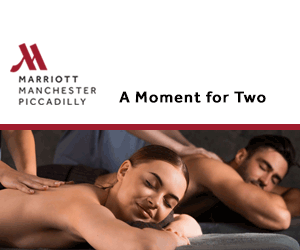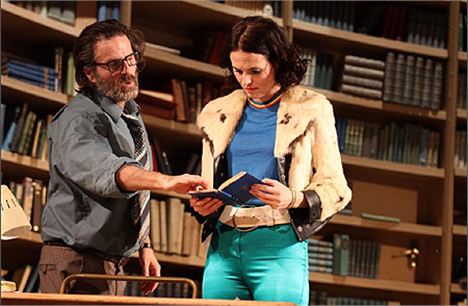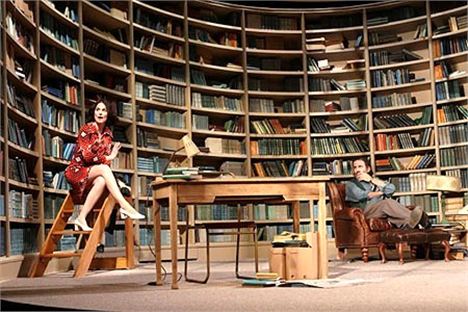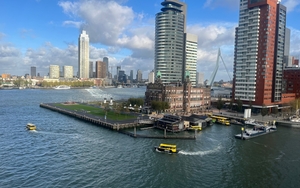I'M tempted to begin this review by stating the obvious. Educating Rita is written by one of this city’s most successful playwrights. Its performance is greeted by an appreciative, homegrown audience in a theatre at the heart of the city centre. The storyline is as well-known as the Three Graces and benefits from two highly talented actors with tons of stagecraft experience. So, in reality, it doesn’t take much imagination to say that this production was bound to succeed at every level.
To be honest, given that it’s the 35th anniversary of its original production, you might have thought it had lost its relevance, zest and immediacy. Far from it. OK, so it’s hard not to refer back to the film version with Julie Walters and Michael Caine for comparisons. But that would be unfair, given the dynamic interpretation, onstage physical chemistry and utterly believable stage presence within the two-hander between Rita [Leanne Best] – the aspiring Open University student and Frank [Con O’Neill] – her erstwhile and oft-inebriated tutor.
The play deals with issues which most people can empathise with across various class and cultural divides, particularly that gap between what’s expected of you in life and what you’d really like to be, to do, or say, or achieve. As we discover, there’s a bit of Rita in all of us, maybe not that personal thirst for “pure knowledge” for its own sake, as such, but certainly, a much deeper question…“is this all there is?”.
For Willy Russell, this is fertile ground because it mirrors his own personal journey from school dropout, though hairdresser and factory worker, to find himself walking through the gates of the old Childwall College to discover his own inner-self through creative writing.
This scenario would be instantly understood by any mature student who’s ever enrolled onto their WEA classes or, more locally, been involved in the various courses with the university’s dept. of continuing education. You can include, here, the more-or-less academically inclined customers of the Cambridge Pub and Ye Cracke.
So why, exactly, is this production so good? Essentially, director Gemma Bodinetz ensured that the crisp dialogue and timing weren’t just right. They had to be absolutely spot-on millisecond right. Furthermore, that the essence of the play kept faith with Russell’s desire to celebrate the value of further education on its own terms and, also, get the message across that an open-access route actually means something more than its parts, rather than its current purpose as a dubious paper qualification for future employment. Attempts to modernise it would have been futile anyway.
Consequently, the original late 1970’s ethos is firmly intact. Good thing too because one-to-one tutorials disappeared long ago and massive tuition fees were just gleams in Vice-Chancellors eyes.
Without doubt, Russell’s unique ability to capture the spirit and voice of working-class Liverpool women, with their dreams left on hold, is unparalleled among his peers.
The choice of LIPA graduate Best to play Rita is perfect and she takes it to the next level, displaying a real naïve innocence and hunger for knowledge, in its broadest sense, to escape her seemingly preordained situation in life.
Similarly, O’Neill brings out a great deal of Frank’s inner demons, from his failed relationships through his self-deprecating attempts at poetry while imprisoned within the dusty book-lined walls of a tenured lecturer position weighing like a life sentence. No wonder his skills were also recognised by a Laurence Olivier award as Best Actor for his part in Blood Brothers.
Rita and Frank are both victims of circumstance but, as the play progresses, Rita’s evolution towards self-fulfilment and independence comes at a personal cost, not only to her marriage but also to Frank’s status as ultimate font of knowledge. While Rita gets drunk on words and books in the search for that greater meaning in life, Frank just gets drunk. Quite gloriously at times.
This subtle reversal of roles is achieved meticulously well, graduating through Rita’s evolving appreciation of the necessary essay-writing and summer school experiences through to Frank’s petty jealousies at her new found ease and confidence with books and students alike. Her subtle changes of costume and accent speak volumes about her transformation.
At its heart, Educating Rita embodies that imperceptible sense of dissatisfaction and wanting to break free to “find yourself”. In this case, Rita wants to learn a metaphorical better song to sing. Her transition began with a courageous spark of individual perseverance to escape the shackles of conformity and social expectations. It’s never easy considering her origins and, coupled with the underlying theme of emancipation as a potential threat to the male social order and status quo, it’s doubly so. Those issues still resonate across the developing world today as strongly today as they did in 1979.
Rita’s desire to become a real student comes to fruition and, eventually, Franks discovers that he’s created a veritable Pygmalion which, for better or worse, opens up another chapter in his own life journey [though we never get to find out] and the end of the play is left deliberately inconclusive. Not that mattered, for there was more than enough satisfaction just being there to enjoy it like a conversation with an old friend.
Finally, credit must be given to Conor Murphy’s set design – the huge convex bookshelf/office reminiscent of the Picton Reading Room and Splinter who had the impressive skills to construct it.
The run lasts until 7th March. Unmissable whilst it’s here in Liverpool.
10/10















